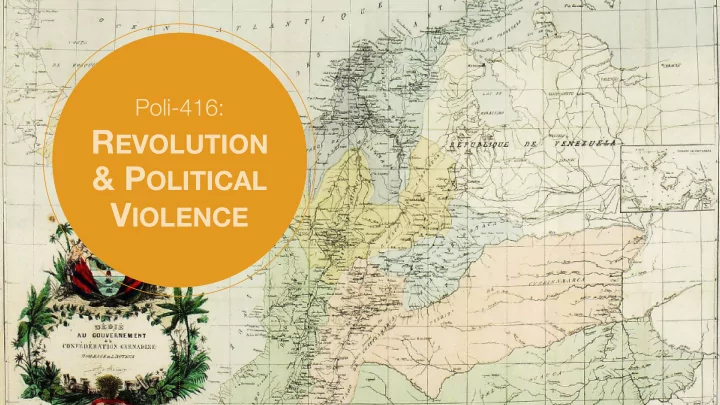

Poli-416: R EVOLUTION & P OLITICAL V IOLENCE
TODAY’S AGENDA 1 9/11, grievances, and American Foreign Policy 2 Manifestos 3 Grievances and political violence
Grievances and armed conflict Intuitive: grievances —> motive for insurrection War in very poor parts of the world/countries Groups explain action via grievances
Grievances and rationality Are grievances “rational” explanations for violence? Strictly speaking: probably not Free-riding: public benefits, private costs Low probability of success “Moral commitments” and emotional attachments drive action
“Hopeless" violence
Local grievances Problems affecting one group in particular part of the world Rohingya: sufi group living in Buddhist country “state-less” people discrimination, ethnic cleansing Arakan Rohingya Salvation Army
Local grievances Mass detentions, repression of religion of Muslim Uighur community
Transnational grievances Universalistic principles International struggle Global group or “ummah” Systemic change Who does this remind you of?
Local meets transnational Local grievances also map onto international politics Graffiti in St. Louis, MO Northern Ireland murals
The non-aggrieved Build up of grievances —> armed struggle Response to repression, violence Sense of injustice, indignity, “can’t take it anymore” What, then, about all the “outsiders” who get involved?
Americans in the Spanish Civil War 2,800 Americans (illegally) fought in the Spanish Civil War 40,000 international volunteers fought against Franco Lincoln Brigade
History repeats itself: The West and the Kurds
Westerners in Kurdish conflict with ISIS PissPigGranddad in Syria Ideological commitments and sympathy
Foreign fighters in ISIS
Where do sympathies come from? Internet and peer networks
Where do sympathies come from? Prisons Sayyid Qutb (1906 - 1966), Egyptian author and theorist
But not all fighters care about “the cause” Many have weak/no ideological training No personal stake in conflict Why fight then? Anomie “the condition in which society provides little moral guidance to individuals” Durkheim
War and boredom Lines up with research showing violent actors often have weak grasp of ideology/religion/cause
Yukio Mishima on boredom Author and right-wing nationalist (1925 - 1970) Opposed Japan’s turn to democracy following WWII Tried to inspire a military coup, failed, committed ritual suicide Today: far right symbol
The demographic story Some societies have large reserves of young, unemployed, unmarried men Sense of alienation, non-belonging, erosion of tradition Participating in war/violence may give purpose
“Youth bulges” and violence “ A large proportion of young adults and a rapid rate of growth in the working-age population tend to exacerbate unemployment, prolong dependency on parents, diminish self-esteem and fuel frustrations”
Where do grievances fall short? People commit violence because they are: Aggrieved or oppressed Lacking purpose, “bored” Ideologically motivated, sympathetic to int’l plights
Where do grievances fall short? But aren’t these things (roughly) present everywhere?
Recommend
More recommend